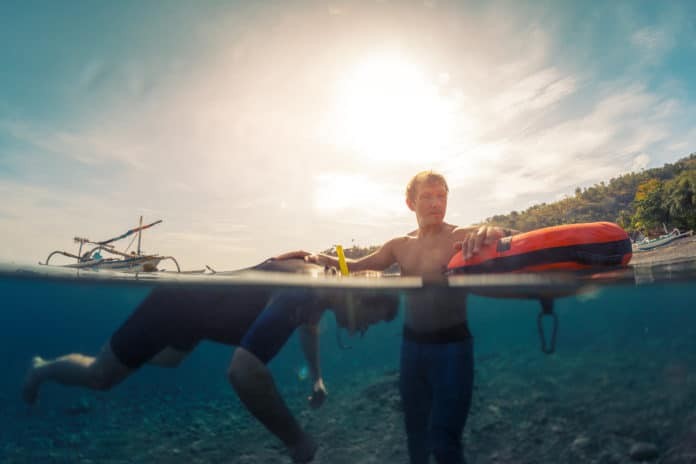How many people dream of taking their hobby and turning it into their full-time job? Whether it is freediving, scuba diving, writing, creating art, etc., people tell us that our dream job should be doing something that we would do for free. But is this always true? Do you daydream of teaching people how to freedive rather than sit in an office all day? Before considering making the switch, here are the 10 positives and negatives of working as a freediving instructor that you may or may not be aware of.
1. No time for your own training
The part of freediving most of us fall in love with is focusing only on ourselves and challenging ourselves, but during high season, you may not have time to train with the influx of students. Even if you do not have a student, another fellow instructor/training partner might, which means that you can go long periods, even in low season, trying and failing to arrange a training session for yourself.
2. Your office is beautiful
It is cliché, but true. If you are working near the sea and get the opportunity to dive in clear, blue water surrounded by tons of different fish and beautiful coral, you never tire of your workspace.
3. Accepting that not all students pass
It can feel like you personally failed a student when they cannot get equalization down when they fail an exam, and so on. The first few times one of your students does not pass a course is difficult and may make you feel like a bad teacher, but you eventually learn to accept that you cannot control how much a student studies or how easily they learn to equalize.
4. Meeting tons of great people
Freedivers are cool people! Whether you are meeting fellow instructors, athletes, or even potential students, you know that these individuals care about the ocean, are usually more laid-back than the average person, and have at least one shared interest with you. And as we all know, freedivers can talk about freediving for hours, so you will always have something to talk about!
5. Diving even when conditions are bad
When you are freediving for pleasure, you are free to look at the pool or the sea and recognize that the weather is cold and rainy, or that the sea is choppy and the current is strong, and decide to take a rest day. Unfortunately, this does not apply when you have a student who is paying for a course, training, or coaching session. If they are your customer and are willing to go, you are obliged to as well.
6. Staying in relatively good shape
You are always the designated safety, which means that you are diving 10+ meters countless times throughout your open water or training sessions. And if that is not enough physical activity for you, factor in that you are handling and transporting a buoy, thick rope, and a heavy bottom weight, setting up the line, pulling up the line, rinsing off all of the equipment. That is a lot of work, which means you are getting considerably more exercise just doing your job than you would be if you were sitting in a cubicle.
7. Dealing with unsafe students
There will always be that student that is there just to record some cool videos for Facebook, partied too hard the night before open water sessions, or wants to dive when you are not looking. It is seriously frustrating, but you are not their mother; you cannot keep them at home after 9 pm, but you can be strict on how you deal with these students and explain to them what is and is not acceptable.
8. Sharing your passion with others
If you are really passionate about freediving, and hopefully you are, it is a special feeling knowing that you are introducing a student to something so incredible. You are planting a seed in their mind that can grow into a true love for the sport, and it is guaranteed that they will always remember you for it.
9. Sickness and physical exhaustion
This is a physical job, which means that there are days where you are so exhausted that it is a struggle just getting your wetsuit off. Even if you get exhausted in the middle of a course though, it is not your student’s problem, and you have to power through it. Being sick is also exceptionally difficult for freediving instructors since it can render equalization impossible and can cause blocked sinuses and sinus squeeze, which leaves them unable to perform proper safety and forces them to hand the student over to someone healthy.
10. The feeling when the student finally “gets it.”
Nothing compares to the moment your struggling student finally gets a technique down or fulfills a requirement after numerous attempts. Watching someone conquer a fear is incredible, and it can make you feel like a superhero instructor; sometimes it feels just as good as if you conquered the obstacle yourself!
Do you have any more suggestions about the positives and negatives of working as a freediving instructor? Let us know in the comments!

